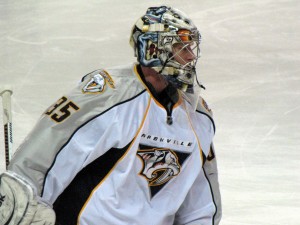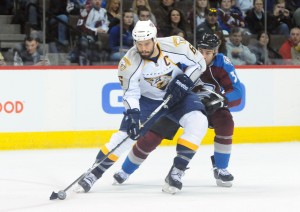
Who was it that said hockey could not survive in the South? That person has obviously never been to Nashville, Tennessee during hockey season.
I was lucky enough to see firsthand how much the NHL is thriving in the Music City this past Saturday when I saw the St. Louis Blues take on the Nashville Predators at Bridgestone Arena.
I arrived in Nashville around 3:00 CDT and was greeted by billboards of players and the Predators’ faithful walking around, proudly displaying their Predators apparel four hours before game time. I ate dinner just one block from the arena at the Hilton Sports Grille two hours before the first puck drop; not only was the place packed full with yellow jerseys, but it was not out of the ordinary to see servers stopping at television screens to catch any news that may have surfaced between practice and the big game.
Then came the match-up with St. Louis; the pinnacle event of the weekend for the city of Nashville. With two goals in the first period (which were both followed by Tim McGraw’s “I Like It, I Love It” on the jumbotron, with the added touch of “Don’t know what it is about the Predators scoring” replacing some lyrics), the hometown team was able to knock off the visiting Blues, 3-1.
The best part of the evening came in the middle of the third period at what is usually a laid-back moment in NHL rinks. When the cameras turned off and the game paused for a television timeout, the Predators fans jumped up from their seats and gave their team a standing ovation that lasted until the next puck drop. No, this was not provoked by the rink announcer or the jumbotron. The fans just decided to try and give their team that extra boost. It seemed to work, as goaltender Pekka Rinne shut the door to make 19 saves on 20 shots in the third period. The win put the Predators one point ahead of St. Louis in the standings.
Leaving the rink was even more excitement. After gathering some notes together and discussing the loss with Blues personnel, I headed to Fifth Avenue to find a taxi to finish up my game write-up at my hotel. I walked past blaring music and people dancing in the streets. Just as I was headed into the cab, I heard over a loud microphone, “This song goes out to the 2012 Stanley Cup Champion Nashville Predators!” as Queen’s “We Are the Champions” played from the open-faced bar.
So what is making hockey work in Nashville? Why is this southern city able to support a hockey club when a city like Atlanta had to up and move to Winnipeg just after 12 seasons?
When Wisconsin businessman Craig Leipold persuaded NHL Commissioner Gary Bettman to expand the NHL to Nashville, he already had a GM in mind to run his team. Former Washington Capitals GM David Poile was the man for the job and he has done nothing but impress the people of Nashville. Leipold and Poile worked together to find Barry Trotz to be the head coach of the team, who had been coaching the Portland Pirates of the AHL. To this day, Poile and Trotz have retained their jobs and are currently the longest-serving GM and Head Coach unit in the NHL.
They have been able to stay with the same organization because they are getting results. The honeymoon period of 1998-2003 did not see the Predators advance to the playoffs, but they have been to the post-season in seven of the last eight seasons. They have won just one playoff series (coming last season with a 4-2 series victory over the Anaheim Ducks), but smart drafting and solid signings have made this team stronger every season.

The faces of the Predators have remained constant since 2008, with defenseman Ryan Suter and Shea Weber and goaltender Pekka Rinne being the driving force behind most victories. These players have become as recognizable in Nashville as country music stars Carrie Underwood and Toby Keith.
The Atlanta Thrashers did not approach the NHL in the same manner. The defunct franchise cycled through five different coaches (General Manager Don Waddell took over the coaching duties at two separate occasions). The faces on the ice faced the same inconsistency; the team had eight different team captains and never really kept a face for the franchise. Drafting Ilya Kovalchuk and Dany Heatley set the foundation for the Thrashers but the inability to keep them and build a solid team around them was the start of the downfall of hockey in Atlanta. Add in that the Thrashers played in just one playoff series in their entire 12-season history (being swept by the New York Rangers in 2006-07), and you have a recipe for disaster in an unconventional hockey market.
You may take a look at the Predators’ attendance figures and see a reason for argument with my logic. In total attendance numbers, the Predators rank just 21st in the league. Take a closer look; Bridgestone Arena, the home of the Predators, holds just 17,113 seats. That means that Bridgestone is the third-smallest venue in the NHL. With a smaller arena, the Predators fans are filling the seats 97% to capacity on average this season.
This probably goes without saying if you saw any of the playoff games in Nashville last playoff season; Bridgestone Arena was sold out for all five playoff games in 2011.
The arena did have more seating in the Predators’ inception year in 1999-2000, but sections 310-312 had many seats removed because there was not a designated area for press members. The Predators organization decided to take the hit on total seats in order to receive better coverage from local news and visiting teams’ media.
If I have failed in voicing my beliefs and I did not sway your opinion Mr. Naysayer, take a trip to the Music City and see for yourself. Nashville is a hockey market and is proof that hockey can survive in the southern United States.